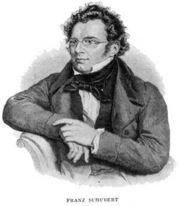 In this article we take a look at Franz Schubert (1797-1828), a composer of the Classical Era in music history. Schubert's leider, symphonies, operas, and liturgical music have earned him recognition as a significant and well loved composer.
In this article we take a look at Franz Schubert (1797-1828), a composer of the Classical Era in music history. Schubert's leider, symphonies, operas, and liturgical music have earned him recognition as a significant and well loved composer.
Of the many prolific composers of the period known as the Classical Era, Franz Schubert was one of the most prolific. Born in the midst of other Classical composers such as Karl Maria von Weber and Schubert's idol, Ludwig van Beethoven, his hundreds of pieces for orchestra and chamber groups are today held as some of the greatest pieces of music ever written. Despite his prolific compositional methods he never received the widespread acclaim that he deserved during his lifetime. It is only today, hundreds of years later that we recognize the abilities of this master composer.
Franz Schubert was a child prodigy, advancing through the ranks of
music beginning at age eleven as a choir boy in Vienna and venturing on
by age eighteen to write such masterpieces of music literature as "Das Erlkonig" a work based on Goethe's Faust.
By age nineteen Franz Schubert had written over three hundred works
including an opera and two complete symphonies. By age 23 he had
expanded his creative works to include three more symphonies, four more
full length operas, and a total of over 300 lieder. Schubert was quoted
once as saying that "I have come into the world for no other purpose
but to compose." Indeed he did.
Some of Schubert's most famous works include his fifth and eighth symphonies(LISTEN) and numerous string quartets and quintets.
Unfortunately his prolific career was cut short when in 1823 he contracted syphilis. His illness changed the way he worked and composed, with his songs becoming more dark and gloomy. Shortly after completing his String Quintet in C he passed away in 1828 and as per his request was buried next to Beethoven in a Vienna cemetary.
